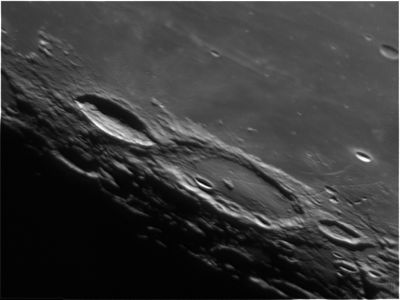Hevelius
Contents
Hevelius, with Rimae Hevelius on its floor
|
Lat: 2.14°N, Long: 67.52°W, Diam: 116.64 km, Depth: 1.93 km, Rükl: 28, Nectarian |

Elias Chasiotis
Hevelius below centre of photograph, shadowed Cavalerius at left (north), Lohrmann at right (south), Oceanus Procellarum "above" (east).
Images
LPOD Photo Gallery Lunar Orbiter Images
- Hevelius and nearby Cavalerius were photographed during the mission of Apollo 17 in december 1972. Westward looking NIKON-camera frame AS17-158-23899 (made in earthlight) shows the (almost non-recognizable) location of Hevelius above centre and slightly to the left of centre (of the frame), while Cavalerius is noticeable at right (near the frame's right margin).
- Small crater Hevelius D and the southern extension of the swirl formation Reiner Gamma were captured in Apollo 17's NIKON AS17-158-23896.
- Frame 3215, made by Lunar Orbiter 3, shows the floor of Hevelius (including Rimae Hevelius). (thanks to page 64 of the book Operatie Maan by the Dutch Moon-popularizer Chriet Titulaer).
- Frame 1174, made by Lunar Orbiter 1, shows Hevelius D (3° North/ 61° West) on an unnamed wrinkle ridge. Compare this low-sun photograph with frame 4162 h1 made by Lunar Orbiter 4. In this LO-4 frame, Hevelius D is the bowl-shaped crater in the field of swirls (the southern extension of Reiner Gamma), near the right margin.
- Research Apollo 17's NIKON photographs and Lunar Orbiter frames: Danny Caes (- DannyCaes Apr 21, 2014)
Maps
(LAC zone 56D4) LAC map Geologic map
Description
Elger
(IAU Directions) HEVEL.--A great walled-plain, 71 miles in diameter, adjoining Lohrmann on the N., with a broad eastern rampart, rising at one peak to a height above the interior of nearly 6,000 feet, and presenting a steep bright face to the Oceanus Procellarum. There are three prominent craters near its crest, and one or two breaks in its continuity. It is not so lofty and is more broken on the W., where three conspicuous craters stand on its inner slope. The floor is slightly convex, and includes a triangular central mountain, on which there is a small crater. The S. half of the interior is crossed by four clefts: (l) running from a little crater N. of the central mountain, on the E. side of it, to a hill at the foot of the S.E. wall; (2) originating near the most southerly of the three craters on the inner slope of the W. wall, and crossing 1, terminates at the foot of the E. wall; (3) has the same origin as 2, crosses 1, and, passing over a craterlet E. of the central mountain, also runs
up to the E. wall at a point considerably N. of that where 2 joins the latter; (4) runs from the craterlet just mentioned to the E. end of 2.
Wikipedia
Additional Information
- IAU page: Hevelius
- Depth data from Kurt Fisher database
- Westfall, 2000: 1.93 km
- Cherrington, 1969: 2.13 km
Central peak height:
- Sekiguchi, 1972: 1.0 km "Very low hill which is oblong to the north-east and south-west direction" - fatastronomer
- On August the 27th, 1788, Johann Hieronymus Schroter observed a dark round spot at Hevelius. It seems to have been unknown from all of Schroter's previous observations. Source: Epic Moon (Sheehan, Dobbins), pages 64, 65.
Nomenclature
- Named for Johannes Hevelius or Johann Hewelcke (January 28, 1611 – January 28, 1687), a Polish astronomer. Hevelius made observations of sunspots, 1642–1645, devoted four years to charting the lunar surface, discovered the Moon's libration in longitude, and published his results in Selenographia sive Lunae Descriptio (1647), a work which entitles him to be called "the founder of lunar topography." See extended biography.
- The name Hevelii appeared as a label for Lubiniezky A on van Langren's map (Whitaker, p. 196). Although Hevelius did not use his own name on his own maps, the name reappeared in its present Latinized form (and in association with the present feature) on Riccioli's map. Beer and Mädler chose to modify the name to Hevel (the form used by Elger, above -- see Whitaker, p. 123). According to Mary Blagg's Collated List (cat. no. 1944, p. 70), Schmidt continued to use the Latinized form; while Neison used both the Beer and Mädler and the Riccioli versions. - JimMosher
- This name was adopted into the original IAU nomenclature of Blagg and Müller (1935) in its Latinized form used by Riccioli, and has continued unchanged.
- Charles J. Byrne's book The Farside of the Moon; a Photographic Guide (Springer, 2008) has two names related to crater Hevelius, these are: Inner Hevelius Formation and Outer Hevelius Formation.
LPOD Articles
Two Dead Mapmakers
Hundred Year Old Hevelius
Heavenly Hevelius
Bibliography
- Hill, Harold. A Portfolio of Lunar Drawings, pages 82, 83.
Named Featues -- Prev: Hess-Apollo -- Next: Rimae Hevelius